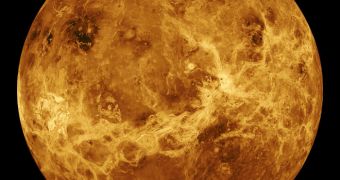The American space agency, in collaboration with the Japan Aerospace Exploration Agency (JAXA), announce the winners of the Venus Climate Orbiter Participating Scientist Program.
The initiative was started by NASA so that it could provide assistance to Japanese colleagues managing the scientific return of the Akatsuki Venus orbiter spacecraft. The spacecraft was launched earlier this year alongside the Ikaros solar sail demonstrator.
In the program, NASA will provide funding for two researchers to move to Japan permanently, as the project unfolds. Another 5 experts will be participating scientists, which means that the will conduct joint research with Japanese colleagues.
A number of proposals were submitted to the American agency for validation. Following consultations with JAXA, NASA decided to select Sanjay S. Limaye and Kevin McGouldrick as the two scientists in residence.
Limaye, who is based at the University of Wisconsin-Madison, will be an investigator of Venusian weather, while Mc Gouldrick, from the University of Colorado in Boulder, will analyze the structure and evolution of clouds and hazes on the planet.
The other five Participating Scientist are Charles H. Acton (Jet Propulsion Laboratory), Ralph D. Lorenz (Johns Hopkins University Applied Physics Laboratory) and Gerald Schubert (University of California in Los Angeles).
Researchers Eliot F. Young (also from UCLA) and Mark A. Bullock (Southwest Research Institute in San Antonio) complete the American science team.
Launched on May 21, the orbiter represents the first weather satellite to be sent to another planet. It has a weight of about 1,100 pounds, and the size of a small car. It will reach Venus in December.
One of the greatest mysteries related to the Venusian atmosphere is the presence of lightning in its clouds. Unlike Earth, the planet has no water droplets and ice crystals in its atmosphere to favor this type of phenomenon.
Experts hope to be able to use Akatsuki in order to determine some of the most important aspects of the planet's atmosphere, as well as its chemical cycle.
“If there's one thing we've been learning about Venus, it's that it's a really dynamic planet that's very changeable, so we need as much long-term data as we can to build up an understanding of how things change over time,” says David Grinspoon.
“Having Akatsuki there should help capture more vital clues to understanding Venus' mysteries,”concludes the expert, who is a curator of astrobiology at the Denver Museum of Nature and Science.

 14 DAY TRIAL //
14 DAY TRIAL //